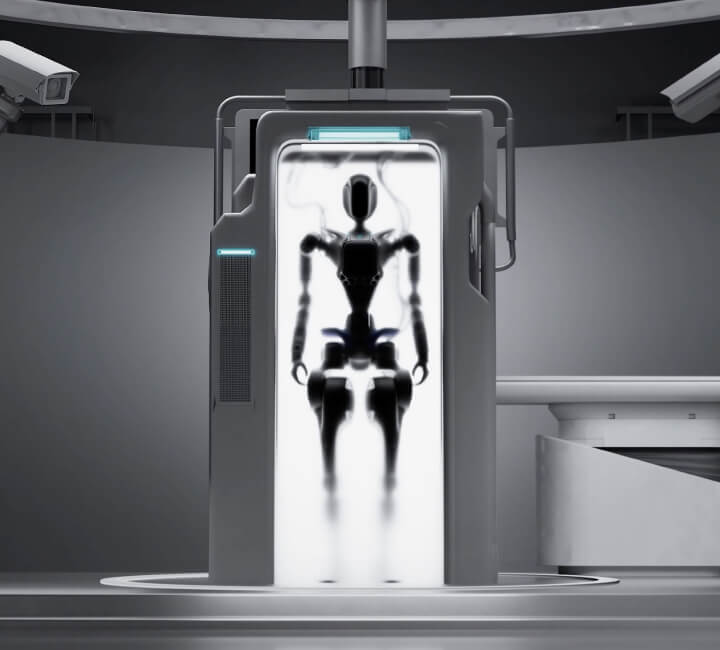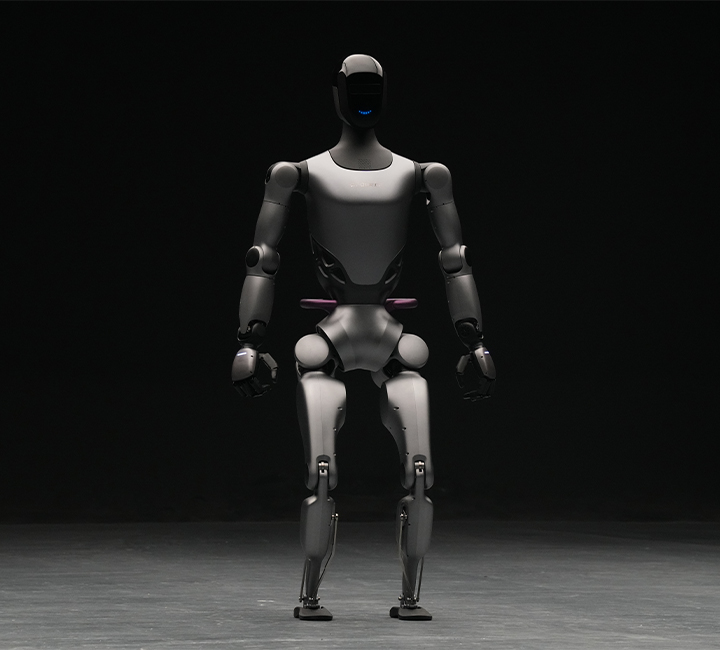Fourier is a company that develops solutions for medical rehabilitation, scientific research, and general use in the fields of robotics and artificial intelligence technologies. Since its establishment, it has focused on different application areas in robotics by designing systems with humanoid movement capabilities. It has created a wide range of products, from rehabilitation technologies to humanoid robots. Through the platforms it develops, it conducts global collaborations in both clinical services and research and development activities.
Establishment and General Information
Fourier was founded in 2015 by Alex Gu in Shanghai, China. The company operates with the goal of developing robots for medical rehabilitation, scientific research, and general use. Initially focusing on exoskeleton systems, Fourier later shifted towards developing humanoid robots and AI-powered solutions. Fourier serves over 2,000 organizations and hospitals in more than 40 countries and regions. In 2024, the company split its brand into two, creating the Fourier (general-purpose robotics and artificial intelligence work) and Fourier Rehab (rehabilitation technologies) units.
Structural Change: Fourier and Fourier Rehab
Fourier
Fourier continues its work on humanoid robots and AI-powered general robotic solutions. One of the most important projects developed by the company in this scope is the GR-1 and its successor model, the GR-2 humanoid robot platforms. Fourier also contributes to work in the field of embodied artificial intelligence through academic and industrial collaborations.
Fourier Rehab
Fourier Rehab is Fourier's sub-unit focusing on rehabilitation technologies. It develops products in many areas, such as exoskeleton systems, upper and lower limb rehabilitation devices, and balance and movement training systems. Fourier Rehab collaborates with over 2,000 hospitals and organizations worldwide and aims to contribute to public health, especially by establishing rehabilitation centers in rural areas.
GR-1 (Fourier)
Technological Development Process
Fourier Intelligence has advanced its technological progress in stages, moving from early exoskeleton prototypes to the introduction of humanoid robots designed for wider applications. In 2016, the company created its first lower-limb exoskeleton prototype, which was based on a modular bipedal simulation design. This prototype marked Fourier’s entry into the field of rehabilitation robotics and mobility assistance. The following year, in 2017, Fourier launched its first commercial product, the Fourier X1, the company’s first-generation exoskeleton robot. The X1 was developed primarily to assist individuals with limited mobility by supporting walking and rehabilitation processes. By 2019, research had expanded to include upper-limb assistance and balance-support technologies. These efforts led to the development of the Fourier X2, which improved on its predecessor by integrating more advanced sensor systems and enhanced stability features. In 2020, the company transitioned toward humanoid robotics with the creation of its first bipedal robot prototype. This development laid the foundation for Fourier’s entry into research on humanlike mobility and robotic agility. The Gen-1 prototype, introduced in 2022, became a crucial milestone in this trajectory. It provided the technical groundwork for agility, balance, and movement capabilities that would later define the company’s humanoid robots, particularly the GR series. In 2023, Fourier unveiled the GR-1, the company’s first mass-produced humanoid robot. The GR-1 was designed both for research environments and for potential industrial use, positioning Fourier among the emerging players in the humanoid robotics market. Finally, in 2024, the GR-2 was released as the second member of the GRx series. Building upon the capabilities of the GR-1, this model offered improvements in hardware and software performance, reinforcing Fourier’s presence in the field of humanoid robot development. Fourier's technological development has progressed through the following stages:
Products
Humanoid Robots
GR-1:
Height: 165 cm
Weight: 55 kg
Actuators: 44 joint motors
Maximum Joint Torque: 230 Nm
Walking Speed: 5 km/h
Integrated Features: Emotional artificial intelligence module, oval-shaped display, and an environmental sound recognition system

GR-1 (Fourier)
GR-2:
Height: 175 cm
Weight: 63 kg
Actuators: 53 joint motors
Hands: 12-DOF (Degrees of Freedom) flexible hands
Maximum Joint Torque: 380 Nm
Design Improvements: Enhanced wiring system and a more compact overall structure
Control System: Virtual reality–based remote operation in addition to direct command control

GR-2 (Fourier)
Rehabilitation Products
Key systems included in the Fourier Rehab product portfolio:
ArmMotus™ M2 Pro – An upper-limb rehabilitation device designed to support recovery of arm mobility and motor functions through robotic assistance.
ExoMotus™ M4 – A lower-limb exoskeleton system that aids walking rehabilitation and assists patients with limited mobility during gait training.
WristMotus™ M1W – A rehabilitation device focusing on the wrist joint, providing targeted support for motor recovery and functional training.
CycleMotus™ Series – A range of rehabilitation systems based on cycling motion simulation, aimed at improving muscle coordination and endurance.
BalanceMotus™ – A balance and movement coordination training system that enhances postural control and stability for patients in rehabilitation programs.
OTParvos™ – A home- and community-based rehabilitation solution, extending therapeutic exercises and monitoring beyond clinical environments.
MetaMotus Galileo
MetaMotus™ Galileo is a robotic rehabilitation platform designed for applications in biomechanical analysis, therapeutic exercise, and sports science. The system integrates virtual reality technologies with robotic mechanisms, allowing users to engage in training that closely replicates real-world movements. By simulating daily life scenarios, the platform supports the development of motor skills and coordination, while also providing targeted balance training.
This integration of immersive virtual environments with precise robotic control enables clinicians, researchers, and sports professionals to analyze human movement in detail and to design rehabilitation programs tailored to individual needs. As a result, MetaMotus™ Galileo functions not only as a medical rehabilitation device but also as a research and performance-enhancement tool within the broader field of human movement science.
Fourier Nexus
Fourier Nexus is an initiative established to foster open innovation and collaborative research in the field of robotics. The program is designed as a global community platform where knowledge exchange, joint experimentation, and cross-institutional partnerships can take place. By engaging with universities, research institutions, and industry partners, Fourier Nexus aims to accelerate advancements in robotic engineering and related technologies.
Its activities encompass a wide range of initiatives, including collaborative laboratory projects, international robot competitions, and campus ambassadorship programs that encourage student involvement in robotics research and development. In addition, events such as Fourier RoboCamp provide participants with opportunities for hands-on learning, team-based problem-solving, and exposure to emerging trends in robotics. Through these efforts, Fourier Nexus positions itself as both a research-driven and community-oriented platform, designed to strengthen the ecosystem of robotics innovation on a global scale.
Ethical Principles
Fourier has stated that the development of its robotic technologies is guided by a commitment to respect for human rights, privacy, and civil liberties. In line with this approach, the company emphasizes that innovation in robotics should not only focus on technical advancement but also be framed within clear ethical boundaries.
To this end, Fourier actively advocates for the creation of ethical standards and legal regulations governing robotics. The company’s position highlights the importance of ensuring that technological progress takes place in a safe, responsible, and socially beneficial manner. By encouraging dialogue on regulation and standardization, Fourier positions itself as a stakeholder in shaping the broader conversation on the ethical use of artificial intelligence and robotics.
Social Contributions
Fourier Rehab plays a role in expanding access to rehabilitation services beyond major urban centers. The company collaborates with hospitals and clinics in rural areas, where medical infrastructure is often limited, to support the broader availability of rehabilitation technologies. Through these partnerships, patients in underserved communities are able to benefit from advanced robotic systems that would otherwise be less accessible.
In addition, Fourier Rehab works with special education institutions to deliver free rehabilitation sessions and therapies for children with special needs. These initiatives are intended to promote equal opportunities in healthcare and education by ensuring that vulnerable groups also have access to innovative therapeutic tools. In this way, Fourier positions its rehabilitation technologies not only as commercial products but also as instruments of social responsibility and inclusion.


